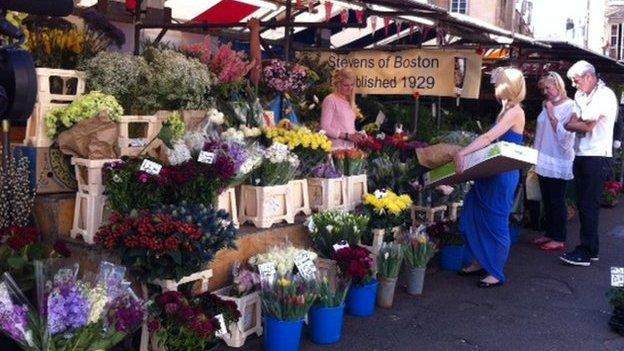Street markets: Adapting to survive the internet age
- Published

Flowers are among the range of produce on sale at Cambridge Market
Bury your head in the Domesday Book of 1086 and you will find mention of the market in the centre of Cambridge.
Centuries later, and the market survives and thrives, open seven days a week with stalls selling everything from fruit and vegetables to wooden toys and ceramic bowls.
Street markets across the country have had to evolve as town and city centres face challenges from out-of-town shopping, the growth of supermarkets, the birth of online retail, and economic cycles.
For many nowadays, that means offering something a bit different with an artisan twist, rather than just the daily groceries.
"We have all different types across the country - night markets, speciality markets, vintage markets, food markets," says Ellie Gill, of the National Association of British Market Authorities (NABMA).
Amid a two-week celebration of markets, external, run by the association, she says they offer a touch of eccentricity to "cloned" town centres. They also maintain the tradition of face-to-face transactions, she says, unlike internet shopping.

Ellie Gill says that more and more speciality markets have opened in the UK
Markets will always face a challenge on price from the powerful supermarkets. As people tightened their belts during the recession, markets felt the pinch.
There were an estimated 38,100 traditional market traders in the UK in 2009, down 14% on five years earlier, a study by NABMA found.
The association estimates that well over 1,000 regular, traditional markets are run across the country.
'Stepping stone'
Their success - and investment from local councils - depends on their ability to come up with something original to sell.
"They offer access to fresh produce and fresh ideas," says Martin Blackwell, chief executive of the Association of Town and City Management.
"Increasingly we are seeing new traders use markets as a stepping stone to growing their business before taking on premises on our High Streets."
Some retailers have argued that markets draw attention away from stores, but others say they attract shoppers who then stay for the day.
Councils in Sheffield, Bolton, Blackburn and Leicester are among the local authorities that have put money into rejuvenating indoor markets to attract shoppers into their towns and cities.
While markets may try to attract the designers of the future, they have always found it tough to shake off the Del Boy image. Owing to the lack of uniform regulation, market stalls have often been the venue of choice for the sale of counterfeit or shoddy goods.
The Real Deal campaign, external is aimed at encouraging all market operators to sign up to a charter and use the same code of practice.
Rights to a refund
Meanwhile, shoppers have various rights to ensure they are not ripped off.

Trading standards officer Mark Oliver says market customers have the same rights as shop customers
Under the Sale of Goods Act, retailers are obliged to offer a refund, repair or replacement of a product that was faulty when it was sold. The rules are the same for shoppers whether they buy from a market stall or from a High Street retailer.
Consumers have no automatic right to a refund if they simply decide they do not like the product and want to take it back.
Faulty goods must be returned promptly, but the problem for many people who have bought shoddy items from a market trader is returning to discover the trader has left the pitch, and has gone to trade elsewhere.
But Mark Oliver, of Cambridgeshire Trading Standards, says that they should not give up.
A well-run market will have contact details of traders, so disgruntled consumers should get in touch with the market organiser if the trader has gone.
Trading standards officers may also help, depending on the severity of the case, and would be alerted via Citizens Advice.
The majority of market traders - like more permanent retailers - rely on a good reputation to trade successfully. So a polite approach from a customer who buys something which turns out to be broken should usually result in a satisfactory resolution.
As for the markets themselves, their existence looks set to continue for centuries to come even if technology revolutionises the way we shop.